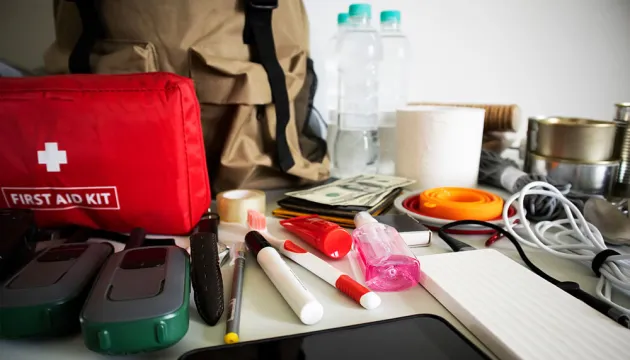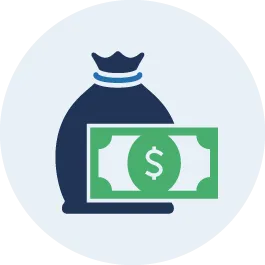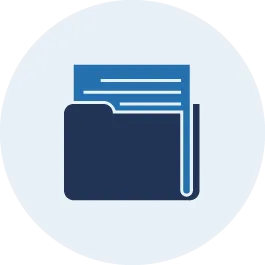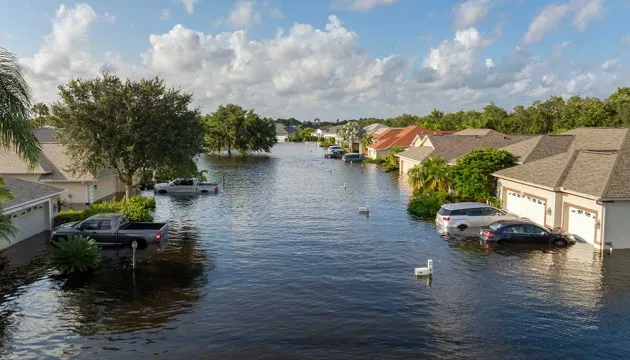Preparing for Unexpected Events
The best way to plan for the unexpected expenses that may result after a disaster is to start saving today. Saving money can help you and your family avoid taking on more debt to respond to the costs of rebuilding your life after an emergency. Gather your important documents and contacts and put them in a safe place and easy to retrieve. Also, review and update your insurance policies to make sure you understand the policies and are able to cover everything.

How to be Prepared
Keep an emergency savings account for events like natural disasters. Consider keeping a small amount of cash in a safe place at home for emergency purchases in case ATMs and credit cards do not work during or after a disaster.

When a natural disaster or other emergency strikes, the primary focus is personal safety. However, once the threat of harm has passed, accessing digital copies of financial and legal documents will be very important to initiate the recovery process. Examples of documents to keep handy include proof of identity, bank and credit union accounts, proof of ownership of your home, insurance and medical records and records for your pets.

Make sure you understand your insurance and reassess the need and coverage. Conducting a household inventory is a great way of record-keeping your assets and possessions prior to seeking or reassessing property insurance. It helps adequately protect what you own and can become proof of possession in the event of an emergency or disaster. Keeping a photographic record and receipts, along with a household inventory, can help determine ownership and value of the property during an insurance claim process.

What to do After a Disaster?
If your property was damaged due to a disaster, collect all insurance policy numbers and contact your insurance company to verify coverage and understand the claims process. Additionally, make an accurate list of damaged property with pictures and videos. Don’t throw anything away until your insurer says it’s safe to discard those items. Lastly, save receipts for any purchases such as lodging, food, or construction supplies, and file claims as quickly as possible. Apply for help via The Disaster Assistance Improvement Program (DAIP). Its mission is to provide disaster survivors with information, support, services, and a means to access and apply for disaster assistance. Contact your mortgage servicer, utility companies, and other creditors. You are still responsible for your monthly obligations even when you are affected by a disaster. Call all your service providers and creditors and ask for options to reduce or delay payments to prevent foreclosure, loss of service, or derogatory reporting on your credit report.

More Information
Avoid Fraud
If you have experienced a disaster, you should be aware of criminals and dishonest people who may try to take advantage of a disaster situation. These individuals may try to gather personal information from disaster survivors to commit identity theft or collect payments for disaster assistance services that they do not provide. If you experience a situation that causes you concern or seems suspicious, you should immediately report it to local authorities or to the National Center for Disaster Fraud.
What is the Operating Status of my Credit Union?
If you need to know the operating status of your credit union, contact the credit union directly or visit its website. You may also find information regarding its status on its social media sites. For credit union branch locations and contact information, use the NCUA’s Credit Union Locator. If you are unable to determine the operating status of your federally insured credit union, call the NCUA Consumer Assistance Center at 800-755-1030 Monday through Friday between 8 a.m. and 5 p.m. Eastern.
Frequently Asked Questions
Common Credit Counseling Scams include the following.
- Upfront Fees – Scammers often demand large upfront fees before providing any services. Legitimate credit counseling agencies typically do not charge significant fees upfront.
- Overpromising – Fraudulent companies may promise to erase accurate negative information from your credit report, which is not legally possible.
- Lack of Transparency – Scammers may not explain your rights or the details of their services clearly. They may push their own programs without considering your specific needs.
- Complex Contracts – Contracts that are difficult to understand or filled with legal jargon can be a red flag. Legitimate services should provide clear and straightforward agreements.
Common debt relief scams include the following.
- Guaranteed Debt Elimination – Scammers may guarantee complete debt elimination, which is unrealistic. No company can guarantee that creditors will agree to settle for less than what you owe.
- Upfront Fees – Similar to credit counseling scams, debt relief scams often require significant upfront fees before any services are rendered.
- High-Pressure Tactics – Scammer may use high pressure sales tactics to rush you into signing up for their services without giving you time to consider your options.
- False Claims – Some scammers falsely claim they can negotiate with creditors to reduce your debt significantly, but they either do nothing or provide minimal assistance with charging high fees.
If you are asked to provide financial information, it may be a scam. Exercise caution with any phone calls, text messages, or emails that claim to be from your credit union, law enforcement, or your phone service provider, especially if they ask for personal or financial information or prompt you to transfer money to a different account. Legitimate credit unions and other institutions will never solicit such details or request these kinds of transfers from you. If you receive such a call, note the department they claim to be from and return the call using the number you have for your credit union on file. Be aware that scammers might supply a number that connects you to another scammer impersonating a credit union employee.
Using your phone for online banking raises several security concerns.
- Phishing – Cybercriminals may send emails or texts that seem to come from a trustworthy source, but their true goal is to deceive you into clicking on a harmful link or providing personal details.
- Insecure data storage – Some apps may save sensitive information such as login credentials and transaction records on your device. If this data is not properly encrypted, it could be accessed by malicious individuals.
- App vulnerabilities – Although mobile banking apps are typically safer than using a web browser, some developers might not adequately address the risks of fraud and money laundering during the development process.
- Coding errors – Errors in coding can introduce vulnerabilities that disrupt an app's functionality, potentially leading to unintended issues.
Consider installing a virus scanning tool on your phone and computer. Ultimately, it's important not to save your online passwords on your phone. Additionally, consider implementing multiple layers of identification, such as using a password along with having the credit union send you a PIN via text.
If you experience property damage due to a disaster, you should contact your insurance company as soon as possible to verify that you have coverage and start the claims process. This will probably involve you taking an inventory of damaged property and providing the insurance company with available photos or video to prove the validity of your claim. Contact your creditors including mortgage servicer and utility companies to see what options are available to reduce or delay payments, prevent foreclosure, loss of service and derogatory credit reporting. Disaster survivors can also contact the Federal Emergency Management Agency (FEMA) to apply for assistance at 800-621-3362 or their website at FEMA.GOV.
Unfortunately, it’s common for scammers to prey on victims of disasters because victims are extremely vulnerable and sometimes desperate to receive assistance. Some examples of this include:
- Contractor Fraud – Unethical contractors sometimes misrepresenting themselves as being affiliated with government entities will scam victims out of funds resulting in shoddy repairs or no repairs at all.
- Price Gouging – The practice of increasing prices of high demand goods and services during a disaster.
- Forgery – Scammers will use a disaster as an opportunity to get access to victims’ personal information and documents to commit identity theft.
- Charity Fraud – Scammers posing as representatives from notable charities including the Red Cross will solicit funds from donors who want to help those affected.
If you are a victim of a scam, you can contact the National Center for Disaster Fraud (NCDF) 24 hours a day. 7 days a week through their hotline number 866-720-5721.